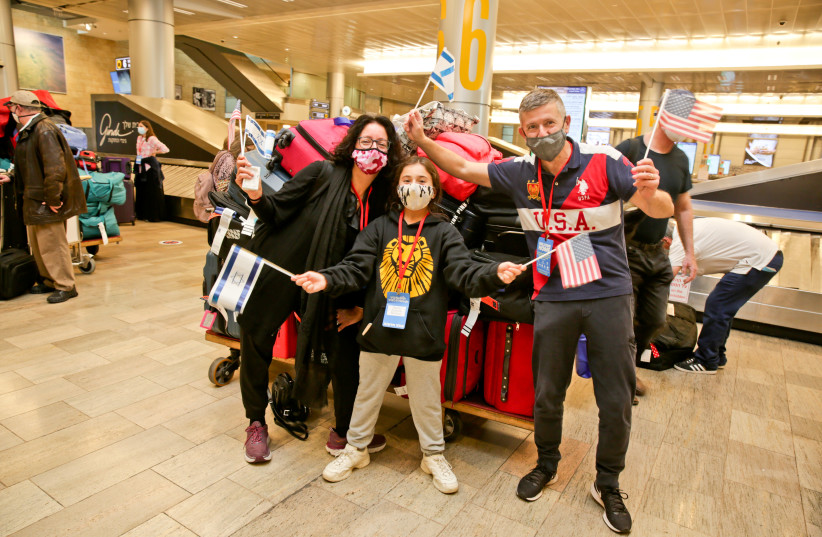Whether it’s because the global economic situation is so dismal due to the COVID-19 pandemic or because Israel has truly become a desirable alternative for world Jewry, the numbers are impressive.
JPOST EDITORIAL

According to data provided by the Jewish Agency for Israel (JAFI), more than 20,000 new immigrants from almost 70 countries made aliyah in 2020.
Whether it’s because the global economic situation is so dismal due to the COVID-19 pandemic or because Israel has truly become a desirable alternative for world Jewry, the numbers are impressive.
“A wonderful thing happened to us: Twenty thousand Jews immigrated to the State of Israel during this pandemic year,” JAFI chairman Isaac Herzog said in a meeting with children who immigrated to Israel during the pandemic from all over the world. “Twenty thousand people who were ready to leave everything behind, in a challenging period of global turmoil, to come build a new life in Israel.”
Some 10,200 came from the Commonwealth of Independent States, including 6,260 from Ukraine and 2,660 from Russia. Another 3,120 arrived from Western Europe, including 2,220 from France and 460 from Britain. By the end of November, some 2,850 immigrants arrived from North America, 2,550 from the US and the rest from Canada. Another 1,500 came from Latin America, including 510 from Argentina and 460 from Brazil.
Aliyah from Ethiopia is set to surpass 1,200, mostly Falash Mura brought to Israel in a special operation dubbed “Rock of Israel” run jointly by the Jewish Agency and the Aliyah and Integration Ministry. Another 219 arrived on a flight on December 22, while an estimated 1,000 more remain in the country.
In addition, there were 280 immigrants from South Africa and 90 from Australia and New Zealand.
The Jewish Agency says it has received about 160,000 inquiries from potential immigrants, while more than 41,000 aliyah files have been opened, including 28,000 from Western countries – twice the number opened in 2019. There was also a 41% increase in files opened for young adults aged 18-35 from Western countries.
Immigration officials estimate that another quarter of a million immigrants could come to Israel in the next three to five years, assuming the government implements a national plan for such a large wave of immigration and absorption. This would represent a sharp rise over previous years; in normal times, Israel absorbs an average of 30,000 immigrants a year. Some 34,000 people made aliyah in 2019, the largest annual number in a decade.
Organizations that help fund aliyah are all reporting a surge in aliyah requests. Following the outbreak of the coronavirus pandemic, JAFI also partnered with the United Israel Appeal and Jewish Federations of North America to provide millions of dollars in much-needed funding to Jewish communities in North America, including interest-free loans to organizations that provide vital services.
There are an estimated 14.7 million Jews in the world, more than 6.8 million of whom live in Israel. The outgoing government needs to make good on its pledge to complete the aliyah from Ethiopia to Israel as soon as possible. As Aliyah and Integration Minister Pnina Tamano-Shata said: “The Israeli government cannot abandon and neglect our brothers and sisters waiting in Ethiopia for years upon years. This injustice that cries out to heaven must come to an end.”
It’s true that Israel is undergoing political turmoil, facing its fourth election in two years, and the medical, economic and psychological hardships of COVID-19 are profound and painful. Although the country is at the start of its third lockdown, Israel is leading the world in its coronavirus vaccination program, having inoculated some 400,000 of its nine million residents in just one week.
This is impressive, and Israel needs to ensure that its borders remain open and its bureaucratic regulations remain easy to overcome for potential new olim. Israel’s ability to continue absorbing new olim during the pandemic is a testament to the importance of aliyah and of Israel remaining the Jewish state and a home to all Jews.
It also illustrates a quality that Michael Dickson and Dr. Naomi L. Baum call “IsResilience” in their new book of that title. They argue that Israel, and Israelis, possess a special resilience that enables them to thrive against all odds.
Those from Western countries who are moving here hoping to improve their financial situation or overcome personal problems may find that Israel is not the answer – no matter how much resilience they possess. But those arriving to participate in the Zionist experience and who are aiming to contribute to the country will find a truly meaningful and rewarding experience. Welcome. You make us all proud.
Content retrieved from: https://www.jpost.com/opinion/amid-covid-19-aliyah-to-israel-continues-653556.